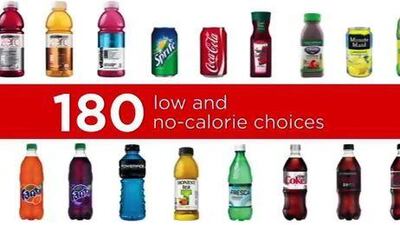NEW YORK // Coca-Cola became one of the world's most powerful brands by equating its soft drinks with happiness. Now it is taking to the airwaves for the first time to address a growing cloud over the industry: obesity.
The Atlanta-based company begin airing a two-minute spot during the highest-rated shows on CNN, Fox News and MSNBC this week in hopes of flexing its marketing muscle in the debate over soft drinks and their impact on public health. The advert lays out Coca-Cola's record of providing drinks with fewer calories and notes that weight gain is the result of consuming too many calories of any kind - not just those in fizzy drinks.
For Coca-Cola, the world's No1 beverage company, the adverts reflect the mounting pressures on the broader industry. Later this year, New York City is set to impose a cap on the size of soft drinks sold at restaurants, cinemas and sports arenas. The mayor of Cambridge, Massachusetts, has already introduced a similar measure, saying she was inspired by New York's move.
Even when PepsiCo Inc, the world's second-biggest maker of soft drinks, recently signed a wide-ranging endorsement deal with the pop singer Beyonce, critics called for her to drop the contract or donate the funds to health initiatives.
New research in the past year also suggested that sugary drinks caused people to pack on the pounds independent of other behaviour. A decades-long study involving more than 33,000 Americans, for example, suggested that drinking sugary beverages interacted with genes that affected weight and enhanced a person's risk of obesity beyond what it would be from heredity alone.
Michael Jacobson, executive director for the Centre for Science in the Public Interest, was sceptical about Coca-Cola's ads and said the company would stop fighting taxes on fizzy drinks if it was serious about helping to reduce obesity.
"It looks like a page out of damage control 101," he said. "They're trying to disarm the public."
The group has been critical of the soft-drink industry and last year released a video parodying Coke's famous polar bears, wherein they became with diabetes and other health problems.
Coca-Cola said its adverts were not a reaction to negative public sentiment. Instead, the idea is to raise awareness about its lower-calorie drinks and plans for the coming months, said Stuart Kronauge, general manager of sparkling beverages for Coca-Cola North America.
"There's an important conversation going on about obesity out there, and we want to be a part of the conversation," she said.
In the advert, a narrator notes that obesity "concerns all of us" but that people can make a difference when they "come together". The spot was produced by the agencies Brighthouse and Citizen2 and is intended to tout Coca-Cola's corporate responsibility to cable news viewers.
Another advertisement, which will run later this week during American Idol and before the Super Bowl, is much more reminiscent of the catchy, upbeat advertising people have come to expect from Coca-Cola. It features a montage of activities that add up to burning off the "140 happy calories" in a can of Coke: walking a dog, dancing, sharing a laugh with friends and doing a victory dance after bowling a strike.
The 30-second advert, a version of which ran in Brazil last month, is intended to address confusion about the number of calories in fizzy drinks, said Diana Garza Ciarlante, a spokeswoman for Coca-Cola. She said the company's consumer research showed people mistakenly thought there were as many as 900 calories in a can of fizzy drink.
The company declined to say how much it was spending on the commercials, which it started putting together last summer. It also declined to give details on its plans for the year ahead.

